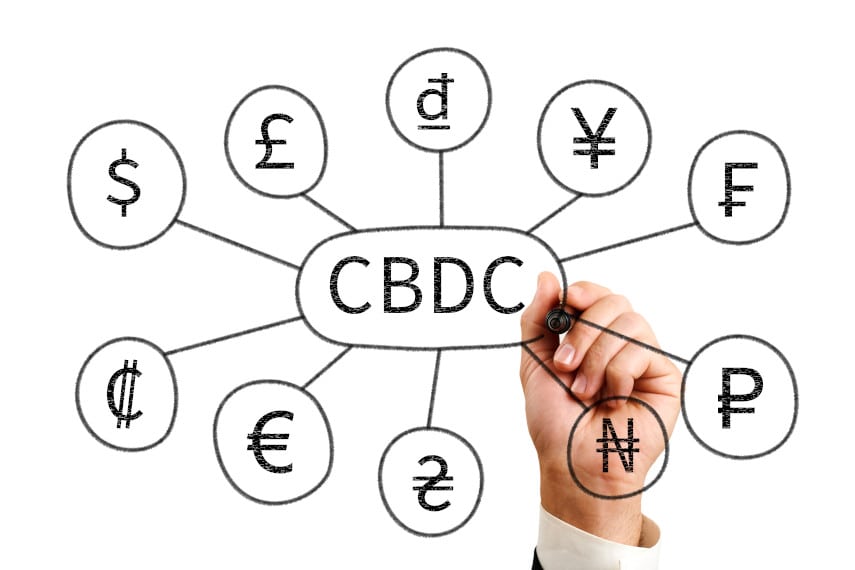
While inflation continues to dominate the headlines, developments below the economy’s surface are continuing, without much fanfare. One of the major developments that could completely upend the way the economy operates is the introduction of central bank digital currencies (CBDCs). CBDCs have only been on the scene for a few years, but they’re already showing signs that they could turn our money and banking system completely on its head.
The Federal Reserve and many other central banks around the world once looked askance at digital currencies and cryptocurrencies, preferring to disparage them as tools for money laundering and criminal activity. But once the utility of cryptocurrencies became apparent, and once it became clear that cryptocurrencies and digital currencies were here to stay, central banks began to see the threat to their monetary monopoly posed by these new entrants.
The Fed was one of the last central banks to start exploring the issue of a CBDC, and risks being overtaken by other central banks. The Fed was undoubtedly spurred by China’s introduction of the digital yuan, an ambitious attempt to introduce a CBDC in the world’s most populous country. And unless the Fed comes up with something quickly, it risks being left in the dust as more countries around the world develop CBDCs.
But CBDCs aren’t as benign as they might seem at first glance. They’re not just another method of digital payment, and they’re potentially something which could completely upend the banking system and destroy banking as we know it.
Obviates Need for Commercial Banks
Right now, central banks don’t issue currency directly to consumers. Banks and financial institutions place orders for currency with the Fed, which in turn orders physical currency from the Bureau of Engraving and Printing. Since commercial banks no longer issue their own currency, but only Federal Reserve Notes, they’re essentially acting as middlemen for the Fed.
The fact that commercial banks offer time and demand deposits is a residual vestige of the times when banks played a far more important role in the monetary system. But even those services may go by the wayside if a digital dollar is introduced.
With a CBDC, the central bank issues digital currency directly. And because everything is digital, there is no physical currency and consequently no physical infrastructure to maintain, a CBDC would allow the central bank to issue currency directly to consumers. Thus consumers could each have an account of their own with the central bank, receiving money directly from the central bank.
In that case, what’s the need for a commercial bank? Why have a Bank of America or Wells Fargo account when you can just have your digital currency ready on demand at the central bank? That’s the potential that exists with a CBDC, and it has banks up in arms.
Bankers Are Opposed
By some estimates, over 70% of business at commercial banks could disappear with the emergence of a CBDC such as a digital dollar. That’s a huge percentage, and it would undoubtedly lead a number of banks to have to cease operations.
No one knows exactly how a CBDC would be implemented, but there’s every reason to believe that it could really shake up the banking sector. Banks thus far have put up stiff opposition to a digital dollar, and they don’t seem to be backing down. They see a CBDC as a potential threat to their operation, so they’ll fight a digital dollar tooth and nail.
Couched in Terms of Financial Inclusion
One of the supposed benefits of a CBDC is greater financial inclusion, allowing the unbanked and underbanked to have better access to the financial system. Because CBDCs are completely digital, anyone with a computer or smartphone can access them. Since many of the unbanked and underbanked own smartphones, this opens up potential access to the financial system for them.
One possible way to gain access to CBDCs is to issue every person an account with the central bank. Just imagine every child receiving a unique bank account with the central bank at birth, akin to receiving a Social Security number. Not only would this potentially increase access to the financial system, it would also allow the government to more easily make direct payments to individuals.
Remember how many people didn’t receive their stimulus payments because they had no or incorrect banking information on file with IRS? With a CBDC, everyone could just receive an automatic airdrop of money to their central bank account without any issues.
Government Has Greater Control Over Your Finances
Of course, the major downside to a CBDC is that the government could exercise greater control over your finances. Units of a digital dollar could end up being trackable, transactions from central bank accounts would be ripe for surveillance, and the government could end up knowing far more about Americans’ financial habits than it should.
A CBDC would also likely replace physical cash, making it far more difficult for Americans to evade taxation, whether intentionally or not. Digital transactions through a central bank account could automatically have taxes taken out of them, or they could be reported to the IRS to ensure that you claim all of your income or declare all of your capital gains transactions on your tax forms.
There are probably just as many negatives as positives when it comes to CBDCs, and they’re far from a panacea. But the momentum seems to be growing, so it may only be a matter of time before we’re all forced into using a digital dollar.
Political Tug of War
Even if a CBDC ends up being a fait accompli in the US, there’s still going to be a tug of war in the meantime. Congress, the Fed, the President, banking regulators, and the banking industry are all going to want to have their say in how a CBDC is developed and how it operates. That means that it could be years before any final decision is made about a digital dollar.
But that also means that you’ll have years to prepare against any potential negative impacts from a digital dollar. Whether you’re concerned about the government being able to track your financial activity through the introduction of a digital dollar, or you’re concerned about the potential impact on the financial system and the banking industry, now is the time to start giving thought to how you will react to the potential for a digital dollar.
Financial security and financial privacy are two important aspects driving those who are skeptical of a digital dollar. And increasingly, more and more people are turning to gold and silver to help secure their financial security and privacy.
When it comes to financial security, a gold IRA or silver IRA can help protect the value of your savings. With inflation high and potentially starting to become entrenched, the value of dollar-denominated assets is declining in real terms every month. And if a CBDC is introduced, it would become even easier for the Fed to inflate the money supply. But gold and silver have been traditional hedges against inflation.
During the stagflation of the 1970s, both gold and silver saw annualized gains of over 30%, far outpacing both markets and inflation. And if gold and silver show similar performance in response to current inflation, owners of gold and silver could end up very happy.
When it comes to financial privacy, many people like to buy gold and silver coins and keep them at home. It’s kind of like storing money under the mattress except that, unlike cash, gold doesn’t automatically lose value to inflation each year. Your holdings of gold and silver remain as private as you want them to be, so that no one has to know how much you own. But if cash ends up being eliminated through the introduction of a digital dollar, physical gold and silver coins may end up being the dominant, if not only, form of physical currency.
Regardless of how you choose to buy gold and silver, it’s important to work with trusted partners. With over a decade of experience helping thousands of customers buy gold and silver, Goldco’s representatives want to help you benefit from gold and silver.
Don’t wait until a digital dollar is forced upon you before you start safeguarding your savings. Call Goldco today and talk to one of our experts about how gold and silver can help you.






